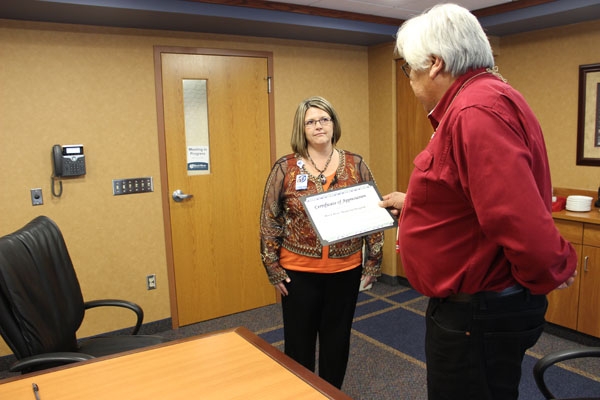Ho-Chunk treatment court programs join forces with Black River Memorial Hospital
By Ken Luchterhand

A recently signed agreement between the Ho-Chunk Nation and Black River Memorial Hospital will help Ho-Chunk Nation court programs.
Representatives from the Jackson County Court, the Ho-Chunk Healing to Wellness Court and Family Wellness Court and Black River Memorial Hospital gathered at the hospital on Thursday, April 27, to recognize that successful partnership.
“The agreement will allow the staff at Black Memorial Hospital to conduct drug testing when we aren’t available, such as holidays and weekends,” said HCN Healing to Wellness Court Project Coordinator Robert Mann.
The drug testing is random and required with any court, including the two Ho-Chunk courts and the Jackson County Treatment Court.
The courts provide the testing supplies and have provided the training to properly obtain the samples. Lab technicians conduct a urinalysis to determine if illegal drugs are present and, if a positive result is obtained, the sample is sent to another laboratory for confirmation. All results are emailed to court coordinators on a regular basis.
Until this agreement, Mann and HCN Family Wellness Court Assistant Clerk Shelley Wilkinson had to be available from the respective court 24 hours, seven days a week for testing. The Jackson County Court presently completes the testing through the Sheriff’s Department.
For the Ho-Chunk Nation, both the Healing to Wellness Court and the Family Wellness Court are instrumental to getting drug offenders back on track to a clean lifestyle.
The Healing to Wellness Court works with adults who are incarcerated and on probation, Mann said. They are often individuals who are transferred to the Ho-Chunk justice system from Jackson County Circuit Court. Offenders can get their sentences reduced or expunged by completing the Wellness program, which is an 18-month program. They can enroll in the program by a referral from the defense attorney or public defender.
The Family Wellness Court involves children and the parents, of which the mother and/or father are undergoing AODA counseling and the children are taken away by means of CHiPs (Child in Need of Protection and/or Services) petition, Wilkinson said. By participating in the voluntary program, they can get their children back sooner.
To comply with the requirements of each court program, individuals must undergo random drug testing. A computer program called the Sentry System initiates random drug testing. People on the program must call every day to the specified number and give their identification numbers to the Sentry System. The computer program then tells them if a drug test is required that day.
If drug testing is required, the individual must show up at the Ho-Chunk Tribal Court building where Mann or Wilkinson were required to be on-call and have to meet the individuals at the court to complete their testing. Now, those individuals can complete the testing at the hospital during weekends and holidays.
“It’s pretty significant because we have three different drug courts,” Mann said, meaning the two Ho-Chunks courts and one Jackson County court.
“It took six months trying to get this agreement done,” he said. “It’s a big goal for everyone.”
The hospital was onboard right from the start, he said.
The two Ho-Chunk courts provide a number of support mechanisms to get individuals away from drugs and alcohol and back on track to a healthy lifestyle.
“A lot of people don’t know the programs exist,” Mann said. “We are trying to educate the community.”
Jackson County Treatment Court and Ho-Chunk Family Wellness Court shares a grant for its programs.
In each program, a team of specialists from different professions is assigned to the individual to guide the person and make sure the person has all the necessary support. All team members meet every week and they appear in court with the individual every other week.
Each has a team consisting of people inside and outside the Nation, which can include a special prosecutor, a defense representative, a social worker, a clinician, a probation agent, and representatives from the State of Wisconsin and the Ho-Chunk Nation. Every team member goes through training, Mann said.
They employ many avenues to get the offender back on track, including VARNA (Vocational Rehabilitation for Native Americans), which helps to pay the rent, get the person job-ready, resume, tuition, vehicle repair, clothes.
“A lot of people are involved with a person to give them a supportive network,” Mann said.
Depending on the individuals’ needs, the programs can send them to inpatient treatment and halfway houses.
“We provide them with the tools necessary to live a sober healthy lifestyle,” Wilkinson said. “People don’t realize how big a concern it really is. It’s important we’re all coming together as a community to fight this battle.”
Home